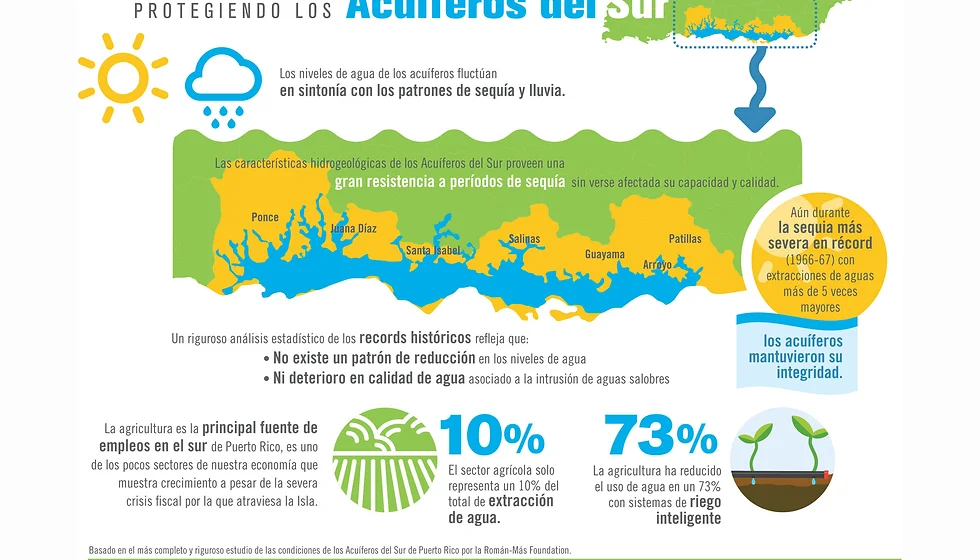Novel study makes it clear that natural water systems are not in danger and that they are essential for the island’s agro-economy
San Juan, Puerto Rico – Despite the moderate drought that has recently affected parts of the island, a new study refutes the notion that there is a crisis in the southern aquifers, a natural source of water that is critical for the area’s agricultural sector . According to the data presented in the report, these bodies of water are in good condition and do not face any threat from agriculture.
The study of the Southern Aquifers was commissioned to the Román-Más Foundation and carried out by the hydrologist and president of the Ángel Román-Más Foundation thanks to a collaboration between the Department of Agriculture of Puerto Rico, the Innovation Fund for Agricultural Development , the Land Authority, AgroPower, Gomango, Superior Angran and the Puerto Rico Agricultural Biotechnology Association (PRABIA). It is the first time that such an exhaustive and conclusive study of the behavior of 179 wells in the south and southwest of the Island has been carried out.
Román-Más offered more specific details of the study, indicating that “groundwater withdrawals have been significantly reduced, around 73 percent. In the Salinas Alluvial Fan, groundwater withdrawals by the agricultural sector accounted for about 10 percent of total withdrawal and less than four percent of withdrawals in the late 1980s. This reduction in use of water by the agricultural sector responds to the implementation of more efficient irrigation systems (precision and intelligent) established in all agricultural biotechnology companies”.
For his part, Ramón González, farmer and president of AgroPower, indicated, “that for more than 100 years his family has been dedicated to agriculture and they finally have a scientific study that confirms and verifies, with data from four consecutive years, what every farmer known; that the aquifer has a cyclical behavior. We know that from January to May it doesn’t rain because of the dry season and then the aquifer recharges during the rainy season.”
According to Sol Rosado, president of PRABIA, “the main finding of this independent study is that agriculture, at all levels, is being practiced in a sustainable manner and with respect for the natural environment, with a special focus on efficiency. And although it is established that agriculture is not the biggest offender in the face of a lack of water, all of us – both small and large-scale farmers, as well as citizens – have the obligation to manage this resource responsibly”.
Rosado stressed that the companies that are part of PRABIA operate under a deep social and environmental commitment framed in sustainable, responsible agriculture and for the benefit of the country.
Other key findings of the study shared by Román-Más:
- Historical records do not reflect a pattern of long-term reduction in water levels or a deterioration in water quality associated with the intrusion of brackish water from the sea.
- The aquifers of the South have an extraordinary resilience to periods of drought that is given by the occurrence of artesian conditions along the coast that prevent the development of a hydraulic gradient and therefore the advance of the cradle of brackish water coming from the sea.
- The southern aquifers have additional capacity to continue agricultural development in the region in order to achieve the goals of the Food Security Program without undermining the availability of water for the domestic sector.
“A rigorous statistical analysis of historical records for water levels and quality, including a Mann-Kendall test with individual data and annual averages, does not reflect a pattern of long-term reduction in the water table or deterioration in water quality. Therefore, any conclusion regarding the overexploitation of the aquifer based on the pattern or historical behavior of the water table and the quality of the water is incorrect or at least not statistically defensible,” said Román-Más.
“However, we know that the aquifers have a limit, unknown at present, that describes a drought of such magnitude that, under a particular extraction scenario, it would cause the loss of artesian pressures along the coast causing the advance of the cradle of brackish water from the sea that we must study and define. This is a topic that deserves more research in the future,” concluded Román-Más, who also recalled that even during the most severe drought on record (1966-67), when groundwater extractions were more than five times those present, the aquifers maintained their integrity (capacity and quality).
Sol Rosado reiterated that agriculture is the main source of jobs in the south of Puerto Rico, one of the few sectors of the country’s economy that has shown growth in recent years and continues to grow. “This track record of success is due in large part to the effective, efficient, and responsible use of critical resources, such as water, by all of us who work the land, including independent farmers, agribusinesses, and PRABIA companies. That is a duty we take very seriously.”

